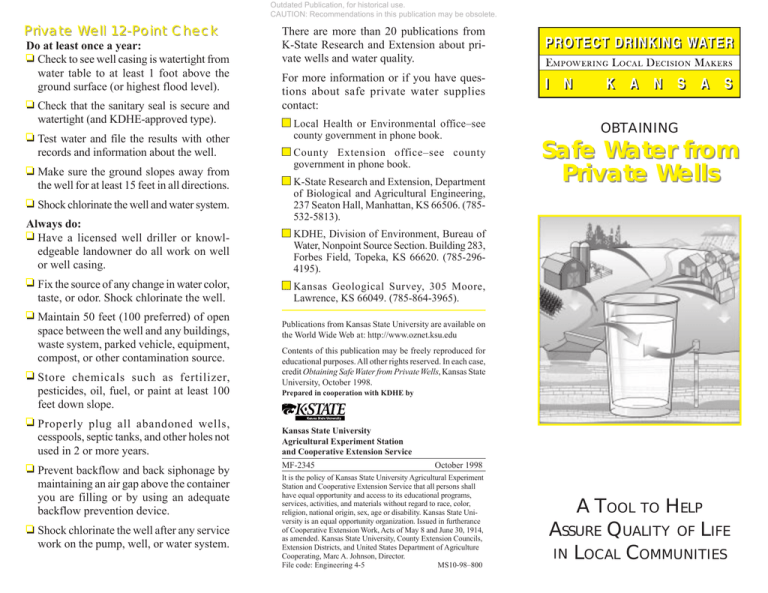
Outdated Publication, for historical use.
CAUTION: Recommendations in this publication may be obsolete.
Private Well 12-Point Check
Do at least once a year:
Check to see well casing is watertight from
water table to at least 1 foot above the
ground surface (or highest flood level).
Check that the sanitary seal is secure and
watertight (and KDHE-approved type).
Test water and file the results with other
records and information about the well.
Make sure the ground slopes away from
the well for at least 15 feet in all directions.
Shock chlorinate the well and water system.
Always do:
Have a licensed well driller or knowledgeable landowner do all work on well
or well casing.
Fix the source of any change in water color,
taste, or odor. Shock chlorinate the well.
Maintain 50 feet (100 preferred) of open
space between the well and any buildings,
waste system, parked vehicle, equipment,
compost, or other contamination source.
Store chemicals such as fertilizer,
pesticides, oil, fuel, or paint at least 100
feet down slope.
Properly plug all abandoned wells,
cesspools, septic tanks, and other holes not
used in 2 or more years.
Prevent backflow and back siphonage by
maintaining an air gap above the container
you are filling or by using an adequate
backflow prevention device.
Shock chlorinate the well after any service
work on the pump, well, or water system.
There are more than 20 publications from
K-State Research and Extension about private wells and water quality.
For more information or if you have questions about safe private water supplies
contact:
Local Health or Environmental office–see
county government in phone book.
County Extension office–see county
government in phone book.
K-State Research and Extension, Department
of Biological and Agricultural Engineering,
237 Seaton Hall, Manhattan, KS 66506. (785532-5813).
OBTAINING
Safe Water fr om
Private Wells
KDHE, Division of Environment, Bureau of
Water, Nonpoint Source Section. Building 283,
Forbes Field, Topeka, KS 66620. (785-2964195).
Kansas Geological Survey, 305 Moore,
Lawrence, KS 66049. (785-864-3965).
Publications from Kansas State University are available on
the World Wide Web at: http://www.oznet.ksu.edu
Contents of this publication may be freely reproduced for
educational purposes. All other rights reserved. In each case,
credit Obtaining Safe Water from Private Wells, Kansas State
University, October 1998.
Prepared in cooperation with KDHE by
Kansas State University
Agricultural Experiment Station
and Cooperative Extension Service
MF-2345
October 1998
It is the policy of Kansas State University Agricultural Experiment
Station and Cooperative Extension Service that all persons shall
have equal opportunity and access to its educational programs,
services, activities, and materials without regard to race, color,
religion, national origin, sex, age or disability. Kansas State University is an equal opportunity organization. Issued in furtherance
of Cooperative Extension Work, Acts of May 8 and June 30, 1914,
as amended. Kansas State University, County Extension Councils,
Extension Districts, and United States Department of Agriculture
Cooperating, Marc A. Johnson, Director.
File code: Engineering 4-5
MS10-98–800
A TOOL TO HELP
ASSURE QUALITY OF LIFE
IN LOCAL COMMUNITIES
Outdated Publication, for historical use.
CAUTION: Recommendations in this publication may be obsolete.
People Need Safe Drinking
Water
All Kansans need a water supply that is safe
to drink. The most reliable supply of safe
water is from public water supplies. They
meet safe drinking water standards more than
98 percent of the time. Conversely, a recent
survey shows only about 40 percent of private wells meet these same standards. Since
no national or state standards apply to private water quality, the standards for
evaluation could be questioned.
Reliable Safe Water
In many rural areas and some small communities and urban-rural fringes, a public supply
is not available. In these cases, landowners
must provide their own water. People who
depend on their own well or spring still need
and deserve water that is reliably safe to
drink. Safe water from private wells requires
wells that have theses characteristics:
located away from and up slope from
contamination sources
constructed to meet current Kansas well
standards
protected from contamination
maintained and water tested annually
Assuring a reliable safe water supply is not
simple. It requires careful attention to many
details. The first settlers dug wells by hand
and used water by the bucketful. Today lending institutions often require minimum flows
and quality similar to public supplies.
Who is Responsible?
Since no quality regulations apply, it is up to
the landowner or water user to assure a safe
private water supply. The owner or user is
responsible for all aspects of owning, operating, and maintaining a water system. The
person needs the knowledge and skills of a
service technician and a sanitarian.
Reliable, safe water from private wells
occurs when the well is properly located,
constructed to standards, carefully maintained, and protected from contamination.
Local Support Needed
for Landowners
Since no federal or state regulations apply to
private well water quality, there is no support from these agencies. Any assistance to
landowners about a private well or spring
must be local. Local government and private
organizations have an important role in education, support, and resources to assure
meeting needs of landowners including:
coordination of consistent local sources of
information about wells, groundwater
supply and water quality
Who Assists Well Owners?
Local resources must be available to meet
the landowner’s needs. Which options are
available in your community?
Education and information
__ County Extension office
__ Local sanitarian
__ Local library
Consultation and technical assistance
__ Local sanitarian
__ County Extension office
__ County Conservation District
Well drilling and well service
__ Licensed well driller
Pump and plumbing service
__ Local plumber/pump installer
__ Well driller
Financial assistance
__ County Conservation District
__ Lending Institution
Water testing
__ Local sanitarian - screening test
__ Certified laboratory
water screening tests and certified
laboratory test kits are available locally
site visits and technical consultation to
evaluate and solve problems
competent and licensed well driller and
service personnel
knowledgeable and helpful water treatment dealers
“Avoid polluting your well and minimize risk of environmental liability for
groundwater,” Morgan Powell, PE.




